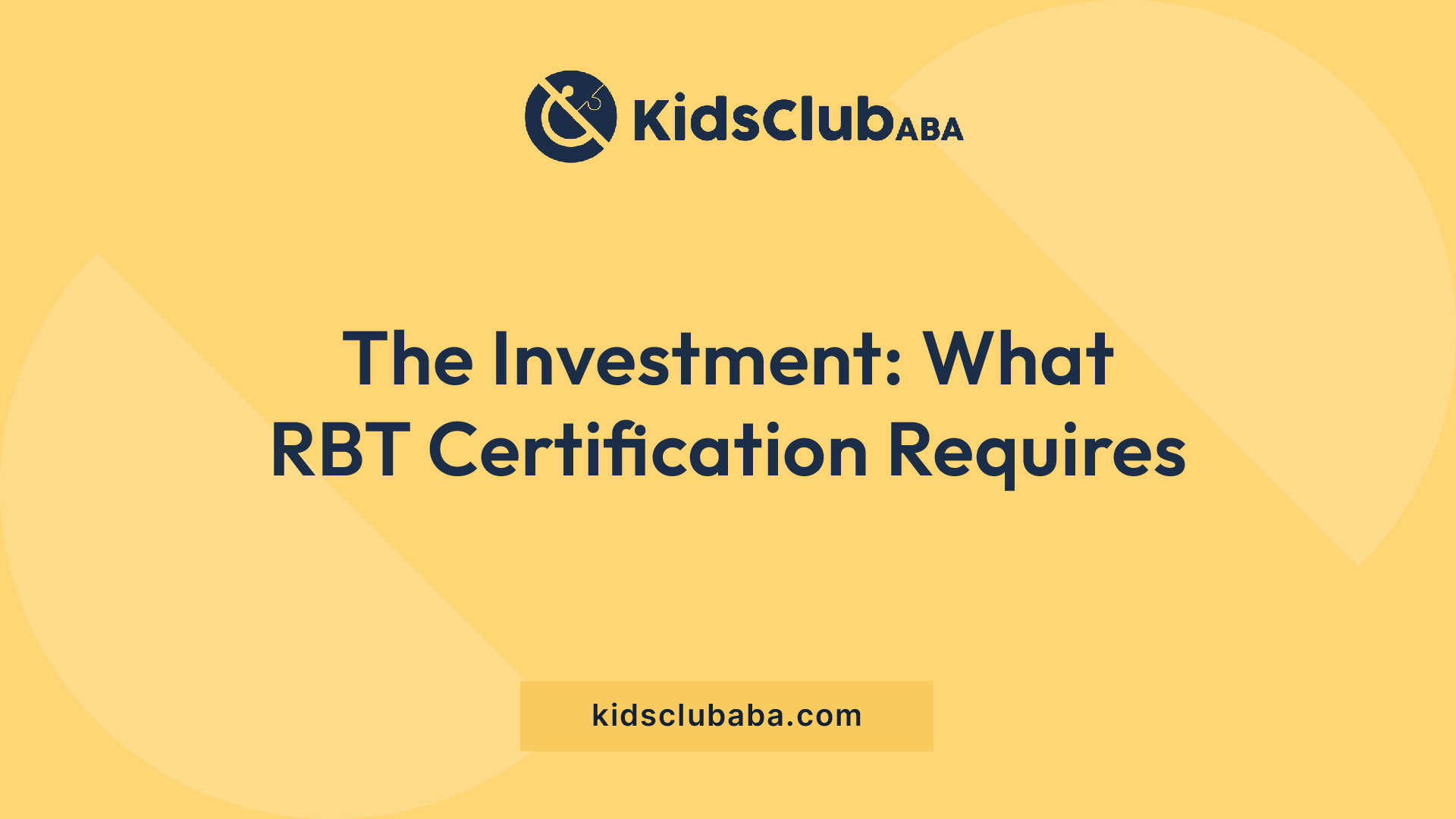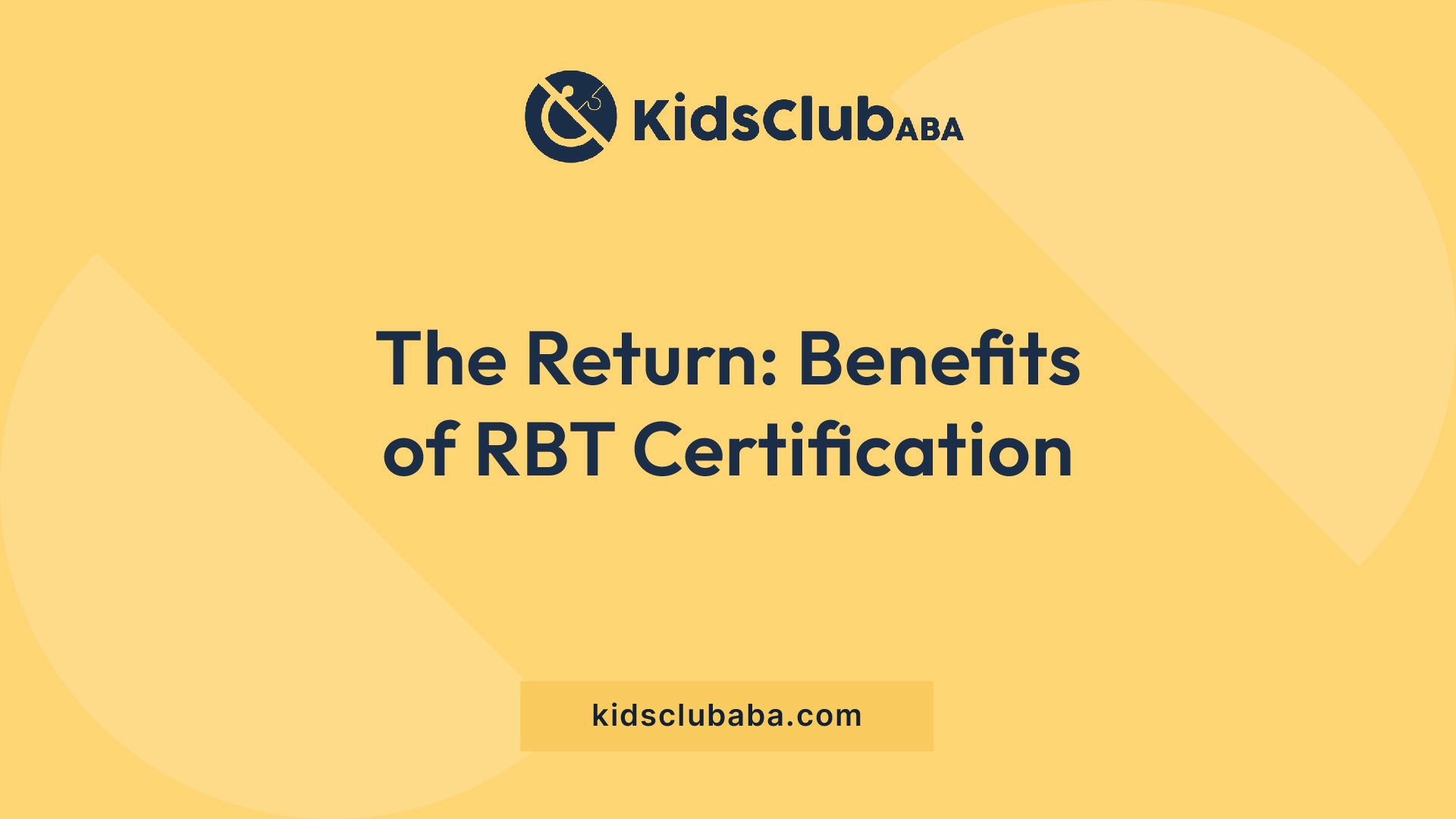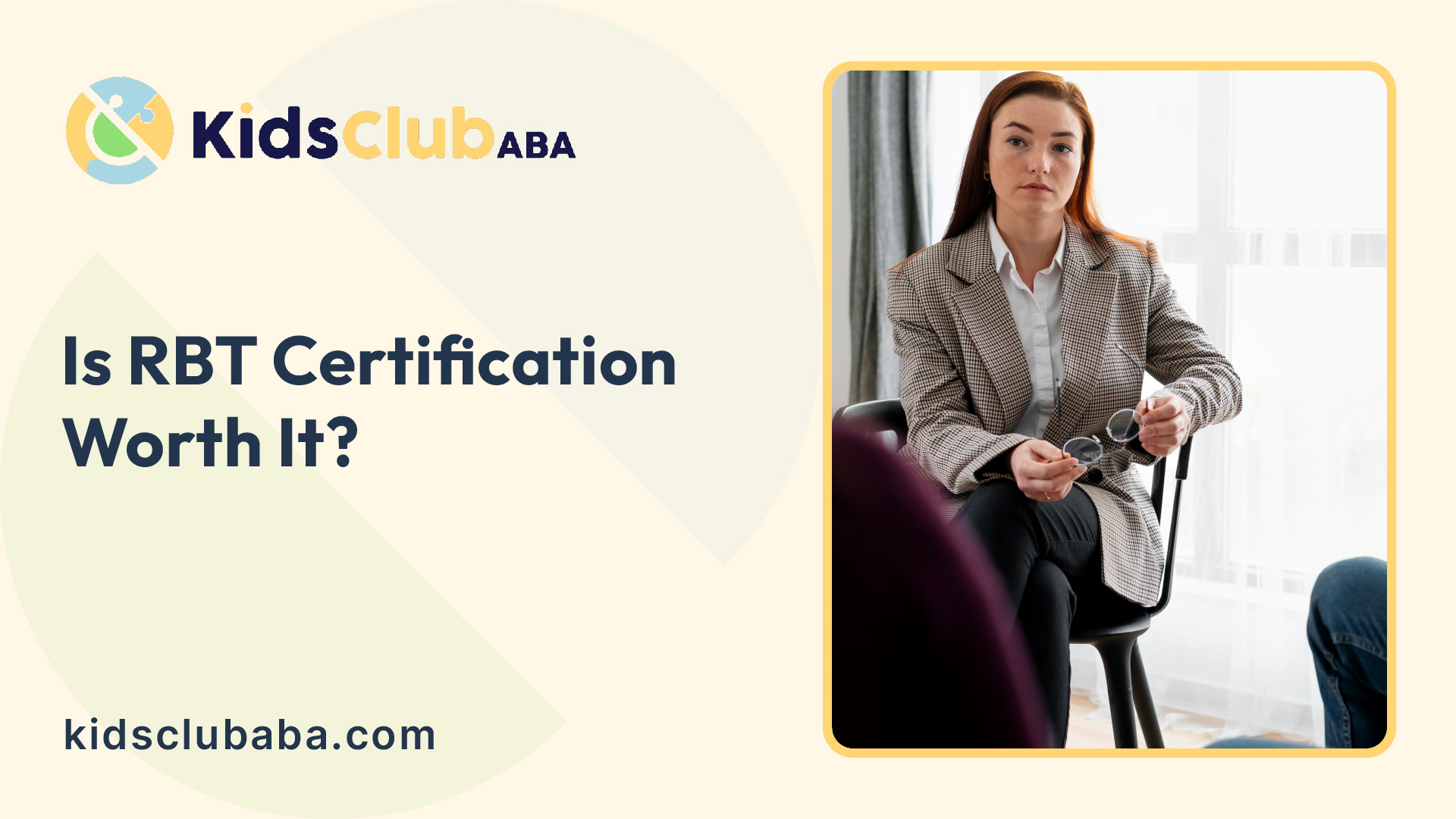Is RBT Certification Worth It? A Data-Driven Analysis
For those considering a career in behavioral health or looking to work with individuals with autism spectrum disorder, becoming a Registered Behavior Technician (RBT) represents an accessible entry point into the field of Applied Behavior Analysis (ABA). Nevertheless, with the investment of time, money, and effort required, many potential candidates wonder: Is RBT certification truly worth it? As a result, this comprehensive analysis examines the costs, benefits, career prospects, and long-term value of pursuing RBT certification.
Table of Contents
ToggleThe Investment: What RBT Certification Requires
Before evaluating whether RBT certification is worthwhile, it’s essential to understand what the process entails:

Time Investment
- 40-hour training program: Typically completed over 1-4 weeks
- Competency assessment: 1-3 hours plus scheduling time
- Exam preparation: Generally 1-2 weeks of studying
- Ongoing requirements: Furthermore, 5% monthly supervision and annual recertification are necessary
Financial Investment
- Training cost: $0-$500 (many employers offer free training)
- Application fee: Additionally, $50 must be paid to the BACB
- Exam fee: Moreover, $45 is required for testing
- Background check: $45-$75 depending on your state
- Annual renewal: $35 to maintain certification
- Total initial investment: Consequently, the range is $140-$655, largely depending on whether training is employer-sponsored
Effort Investment
- Learning technical terminology and principles of ABA
- Subsequently developing competency in implementing behavior reduction and skill acquisition procedures
- Meanwhile mastering data collection methods
- In addition, studying for and passing the certification exam
- Finally, maintaining professional boundaries and ethical practice
According to a 2022 survey of RBTs, approximately 78% reported that the certification process was less difficult than they initially anticipated, with most citing the exam as the most challenging component.
The Return: Benefits of RBT Certification

1. Employment Opportunities
The job market for RBTs continues to show robust growth:
- Market demand: First and foremost, a 22% projected growth rate for related healthcare positions through 2031, according to the Bureau of Labor Statistics
- Position availability: In fact, over 75,000 RBT job openings were posted nationwide in 2022
- Geographic distribution: Additionally, all 50 states now have insurance mandates covering ABA therapy, thus creating nationwide demand
- Employer types: As a result, opportunities exist in schools, clinics, in-home services, residential facilities, and telehealth organizations
A 2023 workforce analysis by the Council of Autism Service Providers found that 87% of ABA service organizations reported difficulty filling RBT positions, thereby indicating strong demand for qualified candidates.
2. Financial Compensation
While RBT salaries vary based on location, setting, and experience, the compensation typically justifies the certification investment:
- Average starting salary: $35,000-$40,000 annually for entry-level positions
- Experienced RBT salary: After gaining experience, $42,000-$52,000 for RBTs with 3+ years in the field
- Regional variation: Meanwhile, high-demand areas like California, Massachusetts, and Washington offer up to 30% higher wages
- Hourly rates: Generally speaking, rates typically range from $18-$25 per hour, with higher rates for specialized skills
- Benefits: Furthermore, 76% of full-time RBTs receive healthcare benefits, according to industry surveys
Notably, the financial investment in RBT certification can be recouped within the first 1-2 weeks of employment for many practitioners.
3. Career Advancement Pathways
RBT certification serves as a foundation for multiple career advancement opportunities:
- Vertical progression: To begin with, there’s a clear path toward BCaBA (bachelor’s level) and BCBA (master’s level) certifications
- Specialized roles: Alternatively, one might pursue lead RBT, trainer, or case coordinator positions
- Related fields: Beyond that, the certification acts as a stepping stone to careers in special education, occupational therapy assisting, or speech therapy assisting
- Entrepreneurial options: Additionally, some pursue private contracting or developing educational materials
Research from the Behavior Analyst Certification Board indicates that approximately 22% of current BCBAs began their careers as RBTs, thus demonstrating the certification’s value as a career launcher.
4. Skill Development and Transferability
The skills developed through RBT training and practice transfer to numerous other professional contexts:
- Data-driven decision making
- Crisis management and de-escalation
- Effective documentation practices
- Behavior management techniques
- Client relationship building
- Professional collaboration
A 2022 survey of former RBTs who transitioned to other careers found that, surprisingly, 84% regularly utilized skills developed during their RBT experience in their new positions.
Making an Informed Decision: Is It Worth It for You?
While the general data suggests RBT certification offers a strong return on investment, the value proposition varies based on individual circumstances and goals:
RBT Certification Is Likely Worth It If:
- You’re interested in behavioral psychology or autism services
- You need an entry-level healthcare position that doesn’t require a college degree
- You’re considering further education in psychology, education, or behavior analysis
- In addition, if you want hands-on experience before committing to graduate education
- Furthermore, if you’re seeking a position with flexible scheduling options
- Above all, if you value work that makes a measurable difference in others’ lives
According to satisfaction surveys, 76% of certified RBTs report being “satisfied” or “very satisfied” with their career choice, with the opportunity to help others consistently rated as the most rewarding aspect of the role.
RBT Certification Might Not Be Worth It If:
- You’re uncomfortable with the physical aspects of the job (active engagement with clients)
- You’re seeking immediately high compensation (since advancement requires time or further education)
- Moreover, if you prefer predictable, routine work environments
- Similarly, if you’re uncomfortable working with challenging behaviors
- Lastly, if you don’t intend to stay in the field for at least one year
Turnover statistics indicate that RBTs who enter the field without clear expectations about the nature of the work tend to leave within the first six months, consequently suggesting the importance of realistic job previews before pursuing certification.
Success Stories: RBT as a Career Foundation
Career Pathway Example 1: Education Focus
- Initially started as an RBT while completing bachelor’s degree
- Subsequently used RBT experience to secure school-based behavior technician position
- Later completed master’s in special education with ABA emphasis
- Currently works as a special education teacher with specialized ABA focus
- As a result, experienced salary progression from $38K (RBT) → $58K (Teacher)
Career Pathway Example 2: Clinical Advancement
- Began as an RBT with no prior experience
- Thereafter worked for 2 years while completing bachelor’s degree
- Eventually promoted to Lead RBT ($5/hour increase)
- Meanwhile enrolled in online master’s program while working
- Simultaneously completed supervised fieldwork hours on the job
- Consequently now works as a BCBA earning $85,000 annually
- In total, the journey from RBT to BCBA took 5 years
Career Pathway Example 3: Healthcare Transition
- Initially started as an RBT after high school
- During this time, discovered interest in speech and language development
- Therefore used RBT experience to strengthen application to speech-language pathology assistant program
- Afterward transitioned to SLPA role with higher compensation
- Currently pursuing master’s in speech-language pathology
- In retrospect, credits RBT experience as “fundamental to understanding development and behavior”
Maximizing the Value of Your RBT Certification
To ensure you get the highest return on your investment in RBT certification:
1. Choose Your Employer Strategically
- Look for organizations that offer:
- Free training and certification support
- In addition, consistent hours and clients
- Furthermore, quality supervision from experienced BCBAs
- Moreover, clear advancement pathways
- Also, tuition assistance if pursuing further education
2. Develop Specialized Skills
- Build expertise in high-demand areas:
- Verbal behavior implementation
- Additionally, feeding therapy support
- Also, working with adolescents and adults
- Furthermore, supporting clients with co-occurring mental health conditions
- Finally, gaining experience with telehealth service delivery
3. Track and Showcase Your Impact
- First, document client progress you’ve contributed to
- Second, maintain records of training and continuing education
- Third, collect testimonials from supervisors and families
- Finally, build a portfolio of behavior plans you’ve implemented successfully
4. Leverage Educational Benefits
- Many ABA providers offer:
- Tuition reimbursement programs
- In addition, flexible scheduling for students
- Moreover, BCBA supervision hours as part of employment
- Furthermore, scholarship opportunities for continuing education
- Ultimately, RBT-to-BCBA pipeline programs
Industry Trends Affecting the Value of RBT Certification
Several emerging trends are likely to impact the value proposition of RBT certification in coming years:
Increasing Credential Requirements
- Some states now require additional licensure beyond RBT certification
- Meanwhile, insurance companies are increasingly specifying minimum experience levels
- Concurrently, specialized RBT credentials are emerging for specific populations
Salary Differentiation
- Currently, there’s a growing salary gap between entry-level and experienced RBTs
- Additionally, premium compensation for bilingual RBTs (typically 5-15% higher) is becoming standard
- Furthermore, higher compensation for RBTs with additional certifications is increasingly common
Technology Integration
- Telehealth delivery is creating new opportunities
- Simultaneously, digital data collection is streamlining workload
- Furthermore, AI-assisted prompting systems are supporting RBT decision-making
Service Expansion
- On one hand, increasing adult services are creating new career options
- On the other hand, school-based positions are becoming more prevalent
- Additionally, hospital and medical center integration is expanding
Conclusion: A Worthwhile Investment for Most
Based on comprehensive market analysis, employment data, and practitioner experiences, RBT certification undoubtedly represents a worthwhile investment for most individuals interested in behavioral health, autism services, or special education pathways. The relatively low barrier to entry, combined with strong job market demand and clear advancement opportunities, consequently creates a positive return on investment both financially and professionally.
The certification’s true value, however, extends far beyond immediate employment prospects. Indeed, RBT certification provides a foundation of skills, knowledge, and experience that serves practitioners throughout their careers, whether they remain in behavior analysis or transition to related fields. For those seeking meaningful work with tangible impact and a clear path for professional growth, therefore, RBT certification offers a compelling starting point.
Ultimately, the question “Is RBT certification worth it?” should be answered not just in terms of immediate job prospects but in the context of your broader career aspirations, personal interests, and desired work environment. For the majority of candidates, in conclusion, the evidence strongly suggests that the answer is yes.

